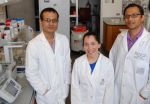(Press-News.org) MIAMI – A new study from scientists at the University of Miami Rosenstiel School of Marine and Atmospheric Science and colleagues confirms rising levels of water vapor in the upper troposphere – a key amplifier of global warming – will intensify climate change impacts over the next decades. The new study is the first to show that increased water vapor concentrations in the atmosphere are a direct result of human activities.
"The study is the first to confirm that human activities have increased water vapor in the upper troposphere," said Brian Soden, professor of atmospheric sciences at the UM Rosenstiel School and co-author of the study.
To investigate the potential causes of a 30-year moistening trend in the upper troposphere, a region 3-7 miles above Earth's surface, Soden, UM Rosenstiel School researcher Eui-Seok Chung and colleagues measured water vapor in the upper troposphere collected by NOAA satellites and compared them to climate model predictions of water circulation between the ocean and atmosphere to determine whether observed changes in atmospheric water vapor could be explained by natural or man-made causes. Using the set of climate model experiments, the researchers showed that rising water vapor in the upper troposphere cannot be explained by natural forces, such as volcanoes and changes in solar activity, but can be explained by increased greenhouse gases, such as CO2.
Greenhouse gases raise temperatures by trapping the Earth's radiant heat inside the atmosphere. This warming also increases the accumulation of atmospheric water vapor, the most abundant greenhouse gas. The atmospheric moistening traps additional radiant heat and further increases temperatures.
Climate models predict that as the climate warms from the burning of fossil fuels, the concentrations of water vapor will also increase in response to that warming. This moistening of the atmosphere, in turn, absorbs more heat and further raises the Earth's temperature.
INFORMATION:
The paper, titled "Upper Tropospheric Moistening in response to Anthropogenic Warming," was published in the July 28th, 2014 Early Addition on-line of the journal Proceedings of the National Academy of Sciences (PNAS). The paper's authors include Chung, Soden, B.J. Sohn of Seoul National University, and Lei Shi of NOAA's National Climatic Data Center in Ashville, North Carolina.
About the University of Miami's Rosenstiel School
The University of Miami is one of the largest private research institutions in the southeastern United States. The University's mission is to provide quality education, attract and retain outstanding students, support the faculty and their research, and build an endowment for University initiatives. Founded in the 1940's, the Rosenstiel School of Marine & Atmospheric Science has grown into one of the world's premier marine and atmospheric research institutions. Offering dynamic interdisciplinary academics, the Rosenstiel School is dedicated to helping communities to better understand the planet, participating in the establishment of environmental policies, and aiding in the improvement of society and quality of life. For more information, visit: http://www.rsmas.miami.edu.
New study confirms water vapor as global warming amplifier
Scientists suggest that water vapor will intensify future climate change projections
2014-07-28
ELSE PRESS RELEASES FROM THIS DATE:
Impact of Deepwater Horizon oil spill on coral is deeper and broader than predicted
2014-07-28
A new discovery of two additional coral communities showing signs of damage from the Deepwater Horizon oil spill expands the impact footprint of the 2010 spill in the Gulf of Mexico. The discovery was made by a team led by Charles Fisher, professor of biology at Penn State University. A paper describing this work and additional impacts of human activity on corals in the Gulf of Mexico will be published during the last week of July 2014 in the online Early Edition of the journal Proceedings of the National Academy of Sciences.
"The footprint of the impact of the spill ...
The bit of your brain that signals how bad things could be
2014-07-28
An evolutionarily ancient and tiny part of the brain tracks expectations about nasty events, finds new UCL research.
The study, published in Proceedings of the National Academy of Sciences, demonstrates for the first time that the human habenula, half the size of a pea, tracks predictions about negative events, like painful electric shocks, suggesting a role in learning from bad experiences.
Brain scans from 23 healthy volunteers showed that the habenula activates in response to pictures associated with painful electric shocks, with the opposite occurring for pictures ...
Cell's recycling center implicated in division decisions
2014-07-28
Most cells do not divide unless there is enough oxygen present to support their offspring, but certain cancer cells and other cell types circumvent this rule. Researchers at The Johns Hopkins University have now identified a mechanism that overrides the cells' warning signals, enabling cancers to continue to divide even without a robust blood supply. In the process, the researchers found that lysosomes — the cell's protein "recycling centers" — help govern cell division decisions. They also uncovered new evidence that certain drugs can halt the growth of tumors that have ...
Facial features are the key to first impressions
2014-07-28
A new study by researchers in the Department of Psychology at the University of York shows that it is possible to accurately predict first impressions using measurements of physical features in everyday images of faces, such as those found on social media.
When we look at a picture of a face we rapidly form judgements about a person's character, for example whether they are friendly, trustworthy or competent. Even though it is not clear how accurate they are, these first impressions can influence our subsequent behaviour (for example, judgements of competence based on ...
Scripps Florida scientists find genetic mutations linked to salivary gland tumors
2014-07-28
JUPITER, FL - July 28, 2014 – Research conducted at the Florida campus of The Scripps Research Institute (TSRI) has discovered links between a set of genes known to promote tumor growth and mucoepidermoid carcinoma, an oral cancer that affects the salivary glands. The discovery could help physicians develop new treatments that target the cancer's underlying genetic causes.
The research, recently published online ahead of print by the Proceedings of the National Academy of Sciences, shows that a pair of proteins joined together by a genetic mutation—known as CRTC1/MAML2 ...
Glucose 'control switch' in the brain key to both types of diabetes
2014-07-28
Researchers at Yale School of Medicine have pinpointed a mechanism in part of the brain that is key to sensing glucose levels in the blood, linking it to both type 1 and type 2 diabetes. The findings are published in the July 28 issue of Proceedings of the National Academies of Sciences.
"We've discovered that the prolyl endopeptidase enzyme — located in a part of the hypothalamus known as the ventromedial nucleus — sets a series of steps in motion that control glucose levels in the blood," said lead author Sabrina Diano, professor in the Departments of Obstetrics, Gynecology ...
Physicists unlock nature of high-temperature superconductivity
2014-07-28
Physicists have identified the "quantum glue" that underlies a promising type of superconductivity -- a crucial step towards the creation of energy superhighways that conduct electricity without current loss.
The research, published online in the Proceedings of the National Academy of Sciences, is a collaboration between theoretical physicists led by Dirk Morr, professor of physics at the University of Illinois at Chicago, and experimentalists led by Seamus J.C. Davis of Cornell University and Brookhaven National Laboratory.
The earliest superconducting materials required ...
Google searches hold key to future market crashes
2014-07-28
A team of researchers from Warwick Business School and Boston University have developed a method to automatically identify topics that people search for on Google before subsequent stock market falls.
Applied to data between 2004 and 2012, the method shows that increases in searches for business and politics preceded falls in the stock market. The study, 'Quantifying the semantics of search behavior before stock market moves,' was published in the Proceedings of the National Academy of Sciences.
The researchers suggest that this method could be applied to help identify ...
Memory relies on astrocytes, the brain's lesser known cells
2014-07-28
VIDEO:
Salk scientists have discovered the link between astrocytes and memory.
Click here for more information.
LA JOLLA—When you're expecting something—like the meal you've ordered at a restaurant—or when something captures your interest, unique electrical rhythms sweep through your brain.
These waves are called gamma oscillations and they reflect a symphony of cells—both excitatory and inhibitory—playing together in an orchestrated way. Though their role has been debated, ...
Scientists discover genetic switch that can prevent peripheral vascular disease in mice
2014-07-28
Millions of people in the United States have a circulatory problem of the legs called peripheral vascular disease. It can be painful and may even require surgery in serious cases. This disease can lead to severe skeletal muscle wasting and, in turn, limb amputation.
At The University of Texas Health Science Center at Houston (UTHealth) Medical School, scientists tested a non-surgical preventative treatment in a mouse model of the disease and it was associated with increased blood circulation. Their proof-of-concept study appears in the journal Cell Reports.
Unlike ...
LAST 30 PRESS RELEASES:
36 months later: Distance learning in the wake of COVID-19
Blaming beavers for flood damage is bad policy and bad science, Concordia research shows
The new ‘forever’ contaminant? SFU study raises alarm on marine fiberglass pollution
Shorter early-life telomere length as a predictor of survival
Why do female caribou have antlers?
How studying yeast in the gut could lead to new, better drugs
Chemists thought phosphorus had shown all its cards. It surprised them with a new move
A feedback loop of rising submissions and overburdened peer reviewers threatens the peer review system of the scientific literature
Rediscovered music may never sound the same twice, according to new Surrey study
Ochsner Baton Rouge expands specialty physicians and providers at area clinics and O’Neal hospital
New strategies aim at HIV’s last strongholds
Ambitious climate policy ensures reduction of CO2 emissions
Frontiers in Science Deep Dive webinar series: How bacteria can reclaim lost energy, nutrients, and clean water from wastewater
UMaine researcher develops model to protect freshwater fish worldwide from extinction
Illinois and UChicago physicists develop a new method to measure the expansion rate of the universe
Pathway to residency program helps kids and the pediatrician shortage
How the color of a theater affects sound perception
Ensuring smartphones have not been tampered with
Overdiagnosis of papillary thyroid cancer
Association of dual eligibility and medicare type with quality of postacute care after stroke
Shine a light, build a crystal
AI-powered platform accelerates discovery of new mRNA delivery materials
Quantum effect could power the next generation of battery-free devices
New research finds heart health benefits in combining mango and avocado daily
New research finds peanut butter consumption builds muscle power in older adults
Study identifies aging-associated mitochondrial circular RNAs
The brain’s primitive ‘fear center’ is actually a sophisticated mediator
Brain Healthy Campus Collaborative announces winner of first-ever Brain Health Prize
Tokyo Bay’s night lights reveal hidden boundaries between species
As worms and jellyfish wriggle, new AI tools track their neurons
[Press-News.org] New study confirms water vapor as global warming amplifierScientists suggest that water vapor will intensify future climate change projections







